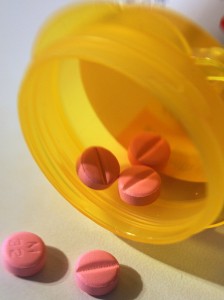
According to The National Institute of Mental Health, a quarter of young Americans suffer or have suffered from anxiety at some point in their lives. A rough six percent of young Americans are also affected by severe anxiety. Those affected by more serious problems often receive medication designed to ease their conditions. Drugs alone, however, are usually an ineffective way of treating someone with an anxiety disorder. In addition, the drugs used to treat anxiety can have significant side-effects although they usually subside in a few days.
Antidepressants
Though originally designed to treat depression, antidepressants may be used to help people suffering from anxiety. One type of antidepressant in particular called selective serotonin reuptake inhibitors, or SSRIs, is usually prescribed to anxiety-prone children and teens. Drugs that fall under this category remain the preferred method for long term treatment of anxiety disorders. The National Institute of Mental Health lists headaches, nausea, difficulty sleeping, and drowsiness as common side effects of SSRIs. For the most part, these effects are felt during the first few days after taking the medicine and quickly disappear.
Benzodiazepines
Though prescribes less often to treat anxiety in children than antidepressants, benzodiazepines are gaining popularity. Unlike antidepressants, benzodiazepines usually take effect soon after they are introduced to the body. A doctor may choose to prescribe benzodiazepines when immediate relief is needed or antidepressants are proving to be ineffective. The University of Maryland Center for Substance Abuse Research lists impaired motor coordination, fatigue, nausea, dry mouth, vomiting, confusion, depression, stuttering, vertigo, and others as possible short term side effects of using benzodiazepines.
Beta-blockers
Beta-blockers, much like benzodiazepines, are not prescribed for long term use. Instead, doctors use them to treat the physical effects of anxiety, such as trembling and sweating. Since they hold a risk of dependency, they are often used to alleviate immediate symptoms rather than to combat anxiety in the long run. Because of these traits, beta-blockers have been found to be particularly useful for those individuals affected by social phobias. The National Institute of Mental Health attributes side effects like fatigue, cold hands, dizziness, and weakness to beta-blockers.
When considering treatment options for a child’s anxiety, drugs should always be thought of as a final resort or compliment to psychotherapy and other safer methods. Many of the drugs prescribed to treat anxiety are meant for people over the age of 18. This is one of the reasons why their side effects are so common in young children. Yet, untreated anxiety poses even greater risks. If you’re concerned about your child’s anxiety issues, talk to your doctor about possible treatment options.
 The post was written by Clinical Psychologist Dr. Marie Cheour. Dr. Cheour has worked as a Professor of both Pediatrics and Psychology at the University of Miami where she received a 2002 Research Award, as a Professor of Neuropsychology at the University of Turko in Finland, and as the Head of the Developmental Brain Research Laboratory, Cognitive Brain Research Unit (CBRU), at the University of Helsinki.
The post was written by Clinical Psychologist Dr. Marie Cheour. Dr. Cheour has worked as a Professor of both Pediatrics and Psychology at the University of Miami where she received a 2002 Research Award, as a Professor of Neuropsychology at the University of Turko in Finland, and as the Head of the Developmental Brain Research Laboratory, Cognitive Brain Research Unit (CBRU), at the University of Helsinki.





